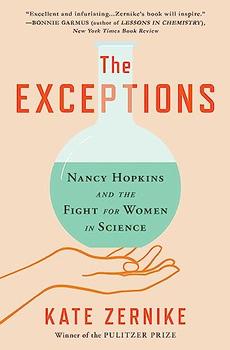Summary | Excerpt | Reading Guide | Reviews | Beyond the Book | Readalikes | Genres & Themes | Author Bio

Nancy Hopkins, MIT, and the Fight for Women in Science
by Kate Zernike
Watson and Crick, atheists both, believed that genes could replace religion as the organizing principle of the universe. Nancy was ripe for conversion. For the month of April, her life became all about Bio 2, Tuesdays, Thursdays, and Saturdays at eleven. Watson fed the students the story of DNA like a mystery: How did it relay its message so that a gene knew to code for a protein, and a bacterium knew how to digest a certain sugar? How did genes know how and when to turn on and off? He started with the question of how cells grow and ended with what happened when they did not get the signal to stop growing and became cancer.
Nancy found herself on the edge of her seat, almost falling off if not for the wooden arm on the desk. She quickly came to guess what the next question was going to be before Watson asked it—an affinity she would later understand was called "good taste in science."
She was hooked. So at the end of Watson's lectures, she went to his office to ask if she could work in his lab.
In contrast to the puritan buildings of Harvard Yard, the Biological Laboratories building was whimsical and grand, not unlike Watson himself. Hidden on a path off Divinity Avenue, it was a massive U-shaped brick building surrounding a large quadrangle. Its facade had been drilled with friezes of animals representing the world's four zoological regions, a sable antelope and Asiatic wapiti among them. Guarding the entrance on either side were two massive bronze rhinoceroses, sized to match the largest known of the specimen and named for England's Queens Victoria and Elizabeth, Vicky and Bessie for short.
From his third-floor office overlooking the rhinos, Watson was busy overthrowing the old world order. He chafed against the traditions of Harvard, its refusal to give him a $1,000 raise that year despite the Nobel, its unwillingness to bestow biology with as much stature as physics or chemistry. He found the biology department fusty and lumbering, too focused on fields like ecology and zoology, which he considered extinct, hobbies at best. Like many scientists of his generation, he had been captivated reading Erwin Schrödinger's What Is Life?, which posited that biology could be understood like physics and chemistry, as a set of universal laws. Molecular biology—and particularly the understanding of DNA, the most significant development of the new field—offered the possibility of understanding the chemistry behind the cellular processes that make up the living world. Why would you waste your time on taxonomies or the competition of the species when you could be figuring out how things worked in every last cell? He trained distinct disdain on Edward O. Wilson, the evolutionary biologist who rivaled Watson as a wunderkind but had been tenured a few months before him. Wilson, a genteel Southerner, in turn saw Watson as a rapacious megalomaniac with no time for collegiality or polite conversation, even a hello in the hallway. Wilson called him "the Caligula of biology," brilliant but "the most unpleasant human being I have ever met." After several tense years and frosty faculty meetings, Watson had succeeded in splitting the department in two, shipping the old-line biologists off to Harvard's Museum of Comparative Zoology across the street and recruiting physicists and chemists to join his own labs to further decode the workings of DNA.
While other students seemed afraid of Watson, the lectures had made Nancy bolder, and she knocked confidently on his door. She entered to a large airy office, one wall all books, the other, all windows. Diagonally in front of her was a piece of art Watson had purchased with his prize money from the Nobel, a life-size wooden likeness of a Papua New Guinean man, naked and roughly anatomically correct from the waist down. Watson knew she was a neophyte, but agreed to work with her without discussion or argument: "Sure," he said, then jumped up from his sparsely covered desk and breezed around her to push through a door into a small room with a lab bench running along its length. He told her she would share it with two other Radcliffe students.
Excerpted from The Exceptions by Kate Zernike. Copyright © 2023 by Kate Zernike. Excerpted by permission of Scribner. All rights reserved. No part of this excerpt may be reproduced or reprinted without permission in writing from the publisher.
Your guide toexceptional books
BookBrowse seeks out and recommends the best in contemporary fiction and nonfiction—books that not only engage and entertain but also deepen our understanding of ourselves and the world around us.